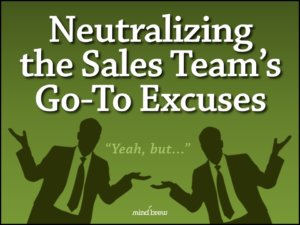When things don’t turn out the way we want or expect, it’s just human nature to first look for any explanation that doesn’t involve a personal failing. While we humans do have thumbs, we prefer to point fingers…at anything else that could explain the shortcoming…no matter how remote the chances.
“But an alien abducted my homework!”
In the webinar, Neutralizing the Sales Team’s Go-To Excuses, we list about 30 of the most common…and some of the most creative…”explanations” for missing the mark with respect to sales performance. Here’s a small sampling:
“You have to realize that a forecast is nothing more than a best guess.”
“I had to disqualify most of my leads because they weren’t good fits.”
“Our prices are just way too high and no one is willing to pay them.”
“Every prospect I’m talking to is looking for something we don’t offer.”
“You know, it takes eighteen months for a new rep to get productive.”
For me, the explanation that produced the biggest chuckle was:
“He’s missed his targets so many times it’s obvious they’re too high.”
Yes, this explanation was actually provided by a sales manager attempting to justify why one of his favorite reps…a close personal friend, BTW…had failed to achieve his goals…for the fourth quarter in a row!
Over the years…or maybe even just last week…I’m sure you’ve heard some doozies yourself. In hindsight, they’re probably pretty funny. At the time they were uttered, however, I’m betting they were more than a little frustrating to hear.
But getting the excuses and explanations out on the table can serve a purpose beyond mere catharsis…
As we explain in the webinar, there’s a lot of value in looking at excuses and explanations as symptoms. Much like prospect objections in a sales cycle, excuses for poor sales performance can provide a diagnostic signal, calling our attention to systemic deficiencies that can be addressed.
Of course, we shouldn’t take the excuse at face value. We have to use diagnostic processes and techniques to dig deeper and identify the real root-causes. But getting the excuses and explanations out on the table is the first step.
So think about all the sales excuses and explanations you’ve heard over the years. Think about all the excuses you can imagine hearing at the end of the next period. List them all out. Group them by common themes.
Shake your head. Yell at the ceiling while spinning in your chair. Have a good laugh. Get it out of your system.
Then, rather than dismissing the excuses out of hand, try looking at them as potential symptoms of other underlying problems and deficiencies. See if you can figure out what the excuses are really saying and where they’re actually coming from. Drill down to the deeper issues that are generating the excuses and/or making them seem valid to others in your organization.
Treating excuses as symptoms is the key to eliminating them once and for all.
Neutralizing the Sales Team's Go-To Excuses
Diagnosing Sales Problems













